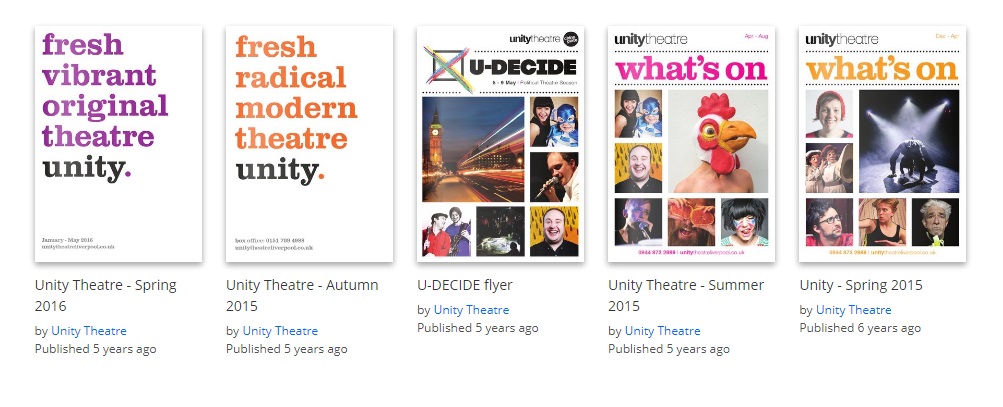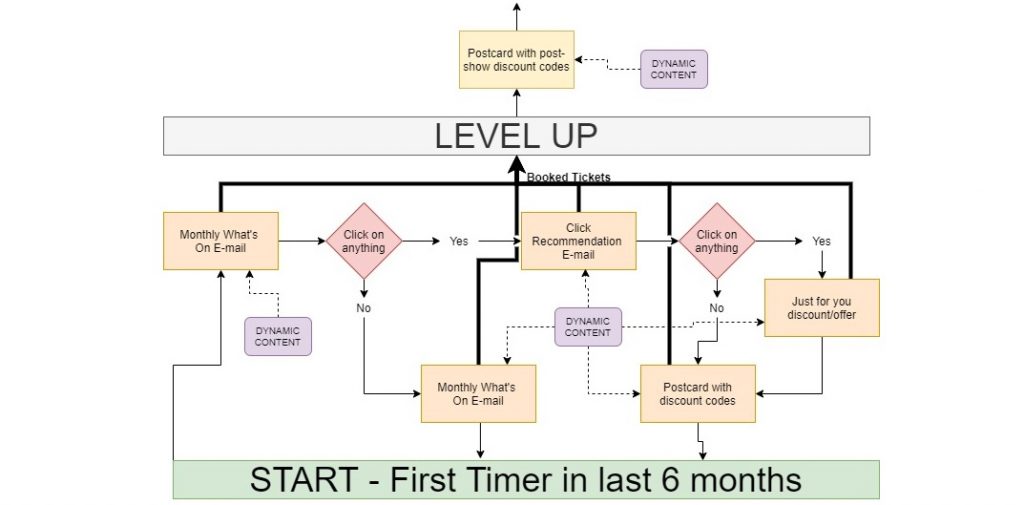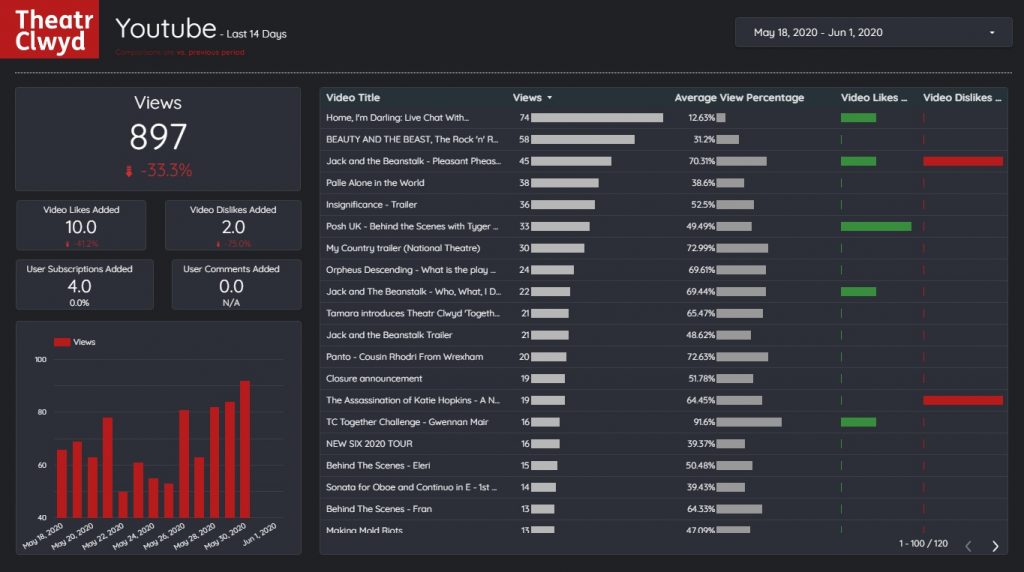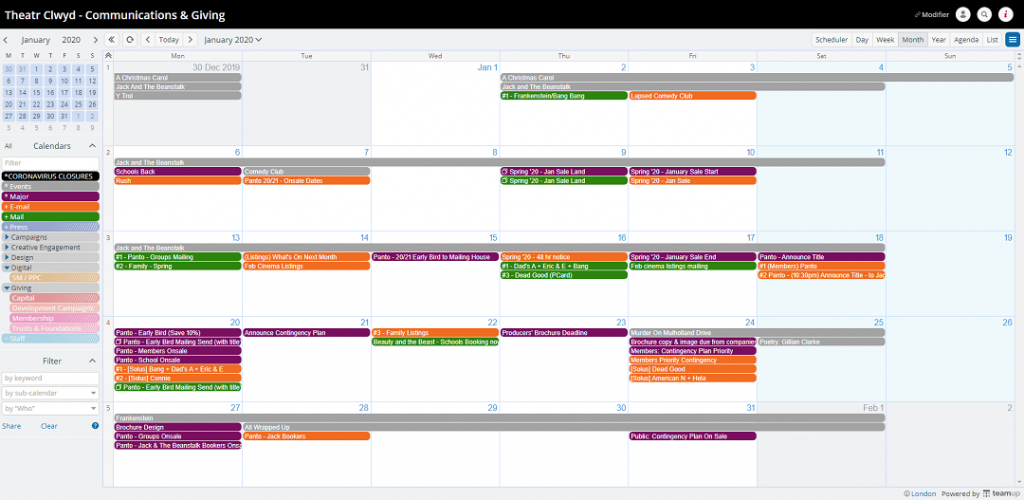I started writing this post in late May, but then hit a block of “what the fuck am I writing any of this for” followed by “is this actually helping anyone?” I struggled to answer either question to be honest and now, in light of theatres closing and redundancies being on the card for people and friends in the sector a blog trying to be witty about arts marketing feels much like a chocolate fireguard. So a quick offer for any arts marketeers out there or organisations struggling who’d just like a chat, nothing more, nothing less. I’m not an expert on much but if you’ve read anything here and think I might be able to help bounce ideas then tweet me, say hi and we’ll get something in the diary – no strings. Xx
Predicting the future at any time is notoriously difficult often met with a simple snorted retort “but where’s my hovercar then!?” Indeed if you’d asked me 10 years ago whether the UK might have to be locked down due to a worldwide pandemic and the Prime Minister would be Boris Johnson I’d have laughed in your face. If you’d followed that up by suggesting Donald Trump would be President I’d start to worry.
Arts Marketing is no different in being a little off the mark now and then when guessing the future. My first AMA Conference was in Newcastle the first time round, around 2006 and I remember sitting in a swelteringly hot seminar in the Sage while the speaker waxed lyrical about how “in 5 years noone will produce a season brochure”. That was also the year of us all talking about our venue Myspace accounts and worrying that sending more than two solus e-mails a month might, just might, come across as needy. But nevertheless I took it in as at least, I decided, it’ll be less theatre season brochures clogging up the glove compartment of my hovercar.
So why then go into the dangerous territory of futurology, or as it’s known by its proper name, guessing?
Well at the moment all we have is the future, but also lots of people are talking about how a broken system can be revolutionised and how this moment is that opportunity – out with the old in with the new – I’m not sure I fully agree with all the sentiment out there but certainly we’ve the chance to do some thinking.
So I’ve written lots of under-developed notes (rather than massive chunks) about what I think may be interesting developments over the next 5 to 10 years – you may disagree with some or all what I say, but that’s okay, it’s about asking questions and finding our own answers. As always I write from a Theatre in the Regions (or Regional Theatre if you will) point of view – more specifically in the UK – so if you read this as a cool urban hipster running an New York art house venue and selling tickets only using snapchat then this might not be for you.
I’ve tried to avoid any grandious hovercar type statements and make it a little more realistic – and these things might be things that a few venues are doing already. This isn’t stuff I’ve done btw, but much is stuff I think I’d like to do or will happen or I’ll need to ponder. Oh and at the end I’ve popped some sketchy thoughts as DVD extras so to speak.
#1 – A Partial Print Revival

We will do more grouped print (brochures) but less other print (flyers). Brochures are a continually highly-effective medium with our most engaged patrons – I get approximately 526,000 e-mails every day, I don’t read them, but a letter I pounce on like an addict after his next fix. There’s more we should be doing, slimming down, being concise and thinking about what audiences need & want to know – personalisation and tailoring should be up there, as should encouraging multi-buying and recognizing and acknowledging how people interact with the organisation. The order and the brochure’s focus will depend on the audience’s interest (or, more likely past behaviour) and increasingly less on a more arbitary “organisational pride” basis (our shows first).
Imagine if the brochure opened with “recommended for you” then told you exactly how your donation had been used… Think of an Argos Catalogue when you’re a kid, but now imagine the toys are at the front and carriage clocks are relegated to the back.
Maybe we need to rethink the brochure – if you were grouping shows into one piece of print and you wanted it personal, tailored and honed for the highest ROI what would it be? Maybe a humble dynamically populated newsletter
#2 – Ready, Steady, Automate

There’s a few people who are doing this who are shit hot (at it) already. Automating some of our marketing activity should be a no-brainer – save time, money, don’t miss stuff because a press release needed writing.
First timers would have a process to step through that’s designed to develop reattendance – it’d include discounts, print, e-mail, all timed to perfection, all of which would be set up once and then let to run with occasional check in or to update content and check data. Higher segments might have pathways to membership, donating, upselling… Think how cleverly automation works in other industries… It’s not without complication. Firstly there’s a challenge with technology – merging box offices, mailing houses and e-mail system – but the parts of what we’d need are out there – check out this from Dotmailer, this from Mailchimp and this from Stannp. Working smarter rather than harder.
#3 – Rationalise data

We’re swimming in data. I’ve been a bit obsessed with it for the past few years, getting variously obsessed with Tableau, Google Data Studio and other things to try and find answers. Apart from it’s nearly fucking impossible.
That might seem a bit negative, but let’s be realistic – there are over 200 metrics you can assess on Analytics alone – most tell you nothing without broader context – that’s before you even get to talking about the metrics available through your box office (actually less, but still a lot so my point still stands). I think a big future decision will be about how we a) make sure we’ve got data integrity so that what we’re using isn’t the odious pile of junk that requires weeks of sorting to understand, b) choose what we want to know, how and when and in relation to what and c) demand some smarter integrations from box offices into data packages.
Also some training. I know experienced consultants who are terrible at data analysis, creating defined judgements out of the vapours of data (I’ve caveat that some are very good). How to read data and choose what data to trust (and what data not to trust) is key.
Also… Funders asking how many twitter followers you have as a metric of success… Sweet. Jesus.
#4 – Grow Digital Teams

Lockdown week one – we all pulled together all our digital content. Some is good, some is okay and some is resolutely terrible. We then fire it out and some gets watched but most gets a small audience and limited viewers. We’re not quite happy with most our show’s recording quality – after all we make trailers to get people to the live, we don’t set out to make a digitally available product (mostly). It’s all a big pile of free that merges with the other big pile of free already out there. Even the NT joined in with extra free. Free all around. Commendable but not sustainable.
I’ve been pondering what none-major UK institutions should, or could be doing to address this when clearly we can’t afford a “NT Live, RSC Live, MET Opera” live thing. I think there’s a gap between free (£0) and the big established names of streaming (£15 a ticket) that sits in that £3.99 sort of range – that looks great on a phone, tablet or laptop at 1920 x 1080 but is never going on the big screen.
Things I’ve been excited about include using filmic pro an app on ipad to film shows, using multi-camera streaming platforms such as recostudio and cinamaker to create mid-grade live mixed performances, filming shows with fixed focal length lenses so that when you watch the show it’s not the NT Live every camera angle showing it replicates the shared experience – similar to how this is filmed – let’s stop hiding the audience. But also how the shared experience is replicated for a pre-filmed product.
Daniel Kitson has a filmed show from Bristol (pre-filmed product) but opens and closes the showing with a live pre-show chat, it’s also made special by the fact that viewing is limited and at a set time.
The problem is artistic ownership – we never take a risk and film things as an experiment because ownership is locked down to those (it sometimes feels) with artistic credentials (btw everyone’s artistic and creative). We need to let go a bit and let our art fly free with people who aren’t making the show – otherwise it’s probably going to get lost forever to the ether. We should be doing audio and video recordings, podcasts, interviews, making sure our shows have legacy.
Also… For camera geeks out there. I know an ipad won’t cut it at the moment. But that’s not it. The fact is that inside 5 – 10 years the quality could be 4k standard, the tech will make sure it looks perfect, technology is enabling creation for lower price points – we need to make sure our skill set and outlook for creation (not technical skills) meets it when when it arrives at that point. 10 years ago the iphone 3G had a fairly basic 2MP camera, the latest version has Dual 12MP Ultra Wide and Wide cameras – 4 iphones down the line what will we be filming?
There’s also a challenge – can we have someone whose role is to do lead this – who has the trust of an organisation to try, fail, try again, fail again, but keep failing better.
#5 – Home Working & Flexible IT

IT is complex and challenging. I’ll level with you – the theatre I work for has historically horrendous IT (it’s better now), when I started we had an office of 4 people with 4 different networks, none of which connected. To pass a file between people you’d put it on a memory stick. So we got box.com – it wasn’t perfect – it was frequently out of sync – but it meant we had shared files for the first time, and it’s getting better.
Then we had an excel sheet with all our date based planning on it – apart from if multiple people opened it you’d end up with files named as marketingdiary_version2_final_final_SF.xls – utterly horrendous. So we found Team Up which does the same job but a million times better.
Crap IT, not having a server, not having much cash, is overcome able. But more importantly, home working is more possible now than it has ever been. I am fully expecting to work no more than 3 days in the building when we reopen – why? Because to do so would now be a hypocrisy. Theatres talk the green talk – driving to work doesn’t help that. Theatres talk about work/life balance and wellbeing – home working helps. Theatres talk about the need to communicate face to face – Zoom shows me nothing but face. Don’t get me wrong, I still crave seeing people in real life, but this offers a real moment of reset for some roles.
#6 – Flexible Tickets

This is a pretty simple one really – under what terms and conditions do we sell tickets?
For most organisations once you’ve bought it there’s no way to change your mind unless the show is cancelled or someone in the box office takes pity on you. Let’s be honest, for such morally good, forward thinking organisations, offering such little flexibility can make us look like hypocritical knobs. The sums are minor, sure they add up over a year, but what sort of goodwill, trust and likability value might be gained.
So. I think someone will say (and a few already do…):
“if you’re ill then we’ll credit your tickets”
“last minute disaster – we’ll credit your tickets”
“hate this show – your money back”
“one of your group dropped out – your money back”
“youngest child refuses to go in because they’re scared – credit for another time”
Now I know people will say “well people will take the piss”, “exploit the system” – but here’s a thought, if that’s your default position then isn’t that a bit sad and tragic? Of course we look at T&Cs and make sure they’re fair and clear, but honestly, it’d be great.
#7 – And then…
There’s a few I chickened out of saying or, rather, didn’t get round to….
- Putting Stage Managers on staff – Makes sense, they’re massively talented, undervalued people and great SMs can make the world a much better place and they’re ridiculously skilled at everything we need.
- Reinvigorating the Rep model – It’s been tried a few times and hasn’t quite been revived – I think there’s a question of how to do it while also reducing physical budget spend and scheduling to maximise run length and the point when WOM starts to hit – also how do we make Rep mean 8 shows not 3 or 4… Opens up multi-buy possibilities…
- Standard 4 day week – Because it increases working efficiency, happiness and wellbeing.
- Standard 30 days holidays – Because it increases working efficiency, happiness and wellbeing.
- Mandatory shared tea breaks for all teams out of the office – because teams need to know each other better and shared space and breaks help with this and the sharing of creative ideas.
- Paid time to do creative projects – It fucks me off when people describe themselves as being a “creative” – anyone can be creative and is creative, our teams are largely incredibly creative, how we nurture that is fascinating, reducing the divide between creative and non-creative feels useful.
- Secondments to other creative organisations – I want to hang out at the NT, the RSC, Chichester, Sheffield, Glasgow Citz and frankly any theatre in the UK or Europe who’ll have me to see how they work and, to put it bluntly, steal every good idea I come across. If we regularly cherry picked the best ideas of everyone how would be all get better? How might we share that?
- Community members in programming groups – Because they should be and we need to stop pretending that the selection of world-class art is anything other than, “well I like that”. Democratisation. Also getting community advocates for show… Wowzers that’d be ace.
- Maintaining hierarchical structure but reducing difference between organisation’s max wage and lowest wage. As written.
- Organisations being attacked for not having enough artists on staff because people don’t understand what marketing, fundraisers and admin do and everyone thinks it’s quick and easy.
- Organisations being attacked for not earning enough income through box office. Because people don’t understand that things don’t sell themselves.
- Someone who hasn’t trained as a director or gone the director path becoming an artistic director. The director in Artistic Director doesn’t mean directing onstage, it means seniority. The role is about vision, about making connections and about inspiring. It’s about knowing your product and how it’s made. I’ve got to work for (and still work for) some fucking incredibly ADs. The commonality isn’t that they’re great directors – it’s a bonus if they are – it’s that they can make the complex jigsaw come together and put square pegs in square holes and set tone and direction. What I’d love to see is convention challenged and I think non-directors in that role might be great (or a fucking disaster). I know marketeers who’d smash that out of the park.
- Organisations to group and share resources such as senior team skills – e.g. a consulting head of marketing shared by 3 venues or sharing box office systems, or becoming theatre groups with shared administrative function. Or even ACE or ACW having consultant marketeers on staff to help organisations…
- More marketeers becoming CEOs.
- Increased reliance on star name programming until we take comedy writing for the stage seriously and stop losing talent to TV.
So that’s it for now. If you read this and have reached this point then drop me a tweet and say hi or comment below!
